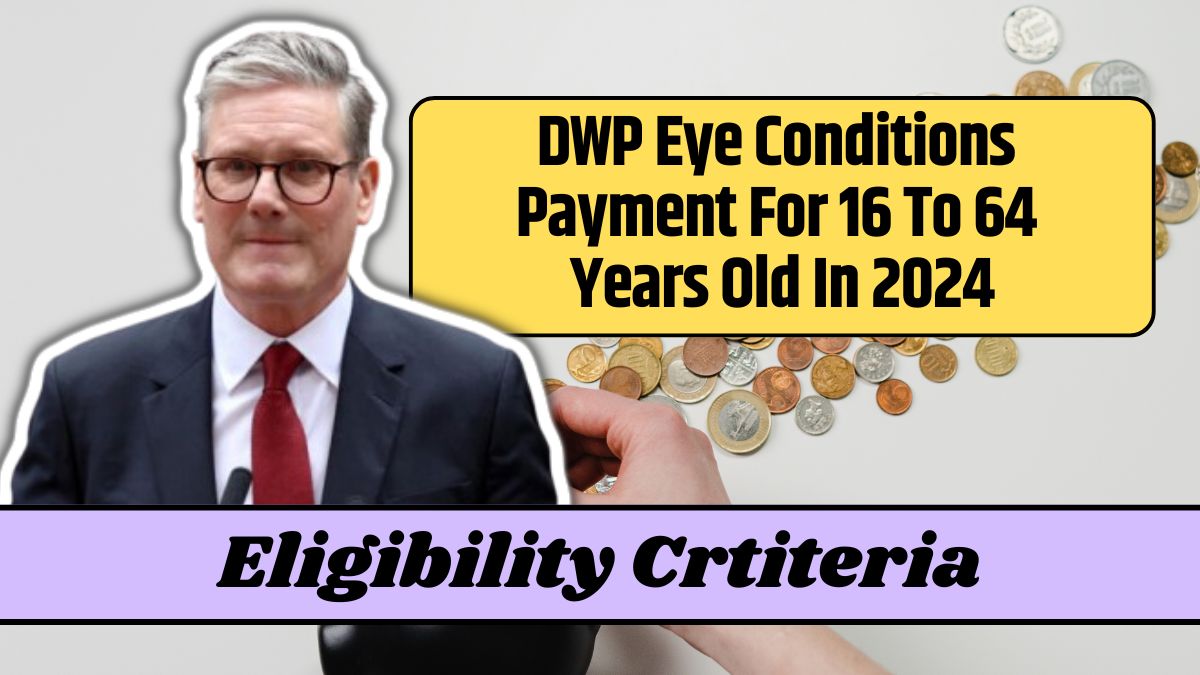The Department for Work and Pensions (DWP) offers financial support for individuals affected by long-term disabilities, including eye conditions, to help cover the extra costs of daily living.
Although the payment is not a direct compensation for vision loss, it supports individuals with the additional challenges they face due to impaired vision.
Here’s everything you need to know about DWP payments for eye conditions, including eligibility, payment amounts, and how to claim.
Overview of DWP Eye Condition Payments
The DWP provides two key benefits for individuals living with eye conditions: Personal Independence Payment (PIP) and Attendance Allowance. These benefits are not based on the specific condition but rather on the level of difficulty you face in daily tasks.
- Personal Independence Payment (PIP): Available for individuals aged 16 to 64, PIP helps those with long-term health conditions, including visual impairments, manage daily tasks or mobility challenges.
- Attendance Allowance: This benefit is designed for individuals aged 65 and over who need assistance with daily living due to disabilities, including severe sight loss. It assesses the level of help needed rather than focusing on the condition itself.
Eligibility for DWP Payments
Personal Independence Payment (PIP)
To qualify for PIP, you must meet the following conditions:
- Age: You must be between 16 and 64 years old.
- Residency: You must reside in England, Scotland, or Wales.
- Condition: You must have a long-term health condition that affects your ability to carry out daily tasks or mobility for at least three months, and it is expected to last at least another nine months.
Attendance Allowance
Eligibility criteria for Attendance Allowance include:
- Age: You must be 65 or older.
- Residency: Like PIP, you must live in England, Scotland, or Wales.
- Condition: You need to require assistance with daily activities due to a disability, such as severe sight loss.
Both benefits require that you show evidence of how your eye condition affects your ability to function in daily life, such as preparing meals, dressing, moving around, and other basic tasks.
Payment Amounts
The amount you receive from the DWP depends on the level of care or assistance you need. Both PIP and Attendance Allowance are divided into components based on your level of need.
Personal Independence Payment (PIP)
PIP has two components: Daily Living and Mobility. Each component offers two rates depending on the severity of your difficulties.
| Component | Standard Rate | Enhanced Rate |
|---|---|---|
| Daily Living | £61.85 per week | £89.60 per week |
| Mobility | £23.60 per week | £61.85 per week |
The maximum amount you can receive is £151.40 per week if you qualify for enhanced rates in both components.
Attendance Allowance
Attendance Allowance also offers two rates, depending on whether you need assistance during the day, night, or both.
| Rate | Weekly Amount |
|---|---|
| Lower Rate | £68.10 per week |
| Higher Rate | £101.75 per week |
You’ll receive the higher rate if you need assistance both day and night.
How to Claim DWP Payments for Eye Conditions
Applying for DWP payments requires a step-by-step process, which involves submitting detailed information about your condition and how it affects your day-to-day life. Here’s how you can apply:
Step 1: Gather Medical Evidence
Collect all medical documentation regarding your eye condition. This includes doctor’s notes, test results, and any reports that highlight how your vision impairment affects your ability to carry out daily activities.
Step 2: Access the Application Form
You can either:
- Apply online via the DWP website, or
- Request a paper form by calling the DWP helpline at 0800 917 2222.
Step 3: Complete the Form
Fill out all necessary information about your condition. You will be asked about your daily activities, including:
- Dressing and washing
- Preparing and eating meals
- Moving around your home
- Managing medication
Step 4: Submit the Form and Evidence
Once the form is completed, submit it with your supporting documents.
Step 5: Assessment
After submission, a healthcare professional appointed by the DWP may contact you for further assessment. This could involve a telephone interview, a face-to-face meeting, or even a home visit to better understand your condition and needs.
Step 6: Notification of Decision
Once the assessment is complete, you will receive a written decision from the DWP outlining your eligibility and the amount you will receive.
DWP Payment Dates
Payment dates for DWP benefits are based on your eligibility and the program you are enrolled in. Payments are typically made every four weeks. You will be informed of your specific payment schedule after your claim is processed.
It’s also worth noting that the DWP adjusts payment dates to avoid weekends and holidays. You can check the exact payment dates for your specific case by logging into the DWP portal or calling the helpline.
DWP payments for eye conditions provide crucial financial support to individuals affected by long-term vision impairments.
Whether you’re applying for PIP or Attendance Allowance, the key to receiving benefits is demonstrating how your condition affects your daily life.
Make sure to gather your medical evidence, complete the necessary forms, and stay informed on the payment schedule to get the assistance you need.
FAQs
Who qualifies for DWP payments for eye conditions?
Individuals aged 16-64 (PIP) or 65+ (Attendance Allowance) with a disability.
How much can I get from DWP payments for eye conditions?
Up to £151.40 per week for PIP, or £101.75 per week for Attendance Allowance.
How do I apply for DWP payments?
You can apply online or request a paper form from the DWP helpline.
What medical evidence do I need for my claim?
You need to provide doctor’s reports, test results, and other documents proving how your vision impairment affects daily activities.
When will I receive my DWP payment?
Payments are typically made every four weeks, with dates confirmed upon approval.



















